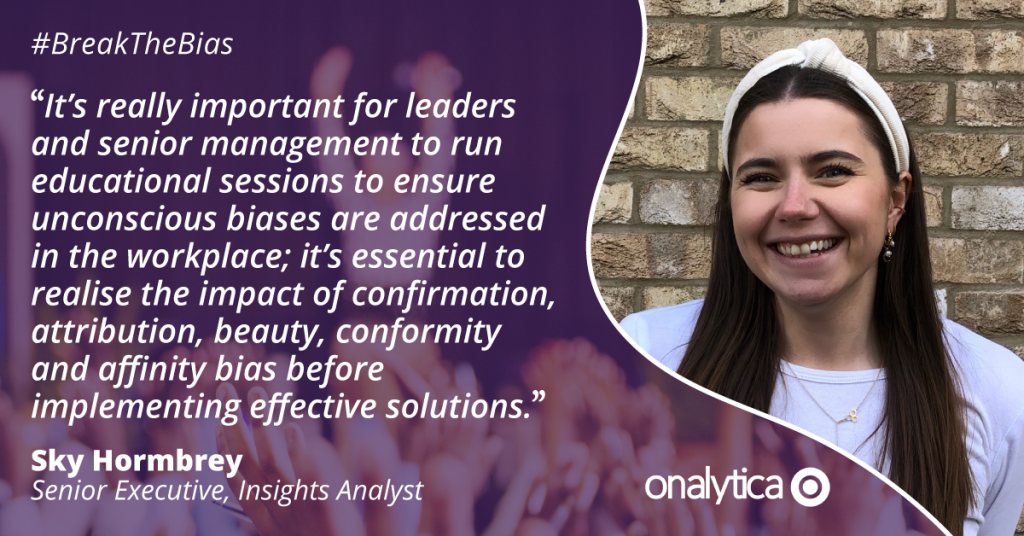In the light of International Women’s Day we have decided to take the opportunity to champion some of the amazing women here at Onalytica throughout the month of March. We’ve carefully selected women who have risen through the ranks but also come from an array of teams, roles and backgrounds.
Sky Hormbrey is a Senior Executive, Insights Analyst. In less than a year Sky moved from a Customer Success Executive to a senior role which highlights her determination, hard work and drive for great results.

Why do you think it is important to celebrate International Women’s Day?
I think it is two fold – first, it’s an opportunity. An opportunity to shine light on the amazing achievements of women, both in our modern society and throughout our history. It’s also an essential reminder of the continued struggles of gender equality. This year’s theme #BreakTheBias puts an important spotlight on the EVERY day negative impacts of gender bias, stereotypes, and discrimination. It’s both a celebration and a reminder that we can’t take our foot off the accelerator in tackling this systemic issue.
This year’s theme is #BreaktheBias, what does this mean to you?
I recently read a brilliant blog from TogetherBand that showcased some staggering facts about gender inequality. Sadly, a lot of people think we’re ‘almost there’ with regards to equal rights for women. Our own lack of global awareness or advantage blindness can be exactly that…blinding to the reality of gender equality. I think a large part of #BreaktheBias is being educated about the bias itself.
The reality is we are far from ‘almost there’, and there’s always more we can be doing both locally and globally:
- 28 girls a minute are being forced to marry against their will
- 1 in 3 women will experience violence
- In the United States, there are fewer women in leadership positions than there are men named John
- 72 countries don’t allow women to open a bank account
- 1 in 10 women have self-harmed because of their body image
Have you faced any barriers in your career due to being a woman? If so, how did you overcome them?
Gender inequality at the workplace doesn’t start and stop with quotas and pay gaps. It’s also about fair day-to-day treatment and changing the global psyche. In previous work environments, I have been referred to in unprofessional and inappropriate ways through pet names or derogatory terms. The people that were using these terms, often didn’t realise how negatively they were being received. I felt comfortable using my voice in this work environment, so spoke to these colleagues directly to help them understand why these terms were inappropriate.
I think it’s really important for leaders and senior management to run educational sessions to ensure unconscious biases are addressed in the workplace; it’s essential to realise the impact of confirmation, attribution, beauty, conformity and affinity bias before implementing effective solutions.
What is the most important piece of advice you have been given that has helped you in your career?
“Don’t be afraid to ask for what you want.” I had a brilliant conversation with one of my female mentors, where we spoke about the fact that being a vocally driven woman doesn’t make you ‘bossy’, ‘too loud’ or ‘obnoxious’ – a narrative we definitely need to shift.
How can we encourage more women to pursue careers in male dominated industries and positions of leadership?
Bottom-Up is obviously important. Everyone should be taught from a young age that opportunities, passions, and goals should not be limited by their gender, race, or background. However, I do believe there is also a lot of responsibility Top-Down; ensuring fair opportunity for women in the workplace & establishing female role models that can pave the way and inspire generations to come.
How important is diversity in the workplace?
It’s not just important, it’s essential. Both diversity AND inclusion. Although I’m no good at dancing, I love this quote from the incredibly inspirational cultural change catalyst, Verna Myers: ‘Diversity is being invited to the party; inclusion is being asked to dance.’
Based on your own experience, what advice would you give to women considering pursuing a career in your field?
I think it’s important to love what you do. The B2B industry marketing space is one that is constantly evolving: if it’s a field that interests you, and you love to learn, knock on the door.
If you could have dinner with three inspirational women, dead or alive, who would they be and why?
Three Emma’s:
- Emma Watson (to listen and learn – I mean WHAT an inspirational feminist)
- Emma Thompson (I’ve love to talk to her about her work in the mental health field, alongside hearing all her fabulous and funny stories)
- My mother (nothing better than having dinner with the person who motivates you the most – I look forward to celebrating all the wonderful mothers at the end of this month)
What women should other aspiring marketing leaders follow?
- Verna Myers: She’s done some incredible TED talks (here’s a personal favourite which has a particular focus on racial gender bias, specifically in relation to young black men: How to overcome our biases? Walk boldly toward them)
- Elizabeth Day: If you’re a podcast lover, I can’t recommend ‘How to Fail’ enough – not only a wonderful concept, but some incredible female guests
- Shani Dhanda: A very inspirational activist
- Ngozi Okonjo-Iweala Especially if you have a keen interest in environmental sustainability
Of course, learning is a gift and there are so many wonderful people to follow which can inspire, educate, and motivate. Another thing I think is really important is talking to the women around you. Starting these localised conversations only boosts the bottom-up impact we need.
